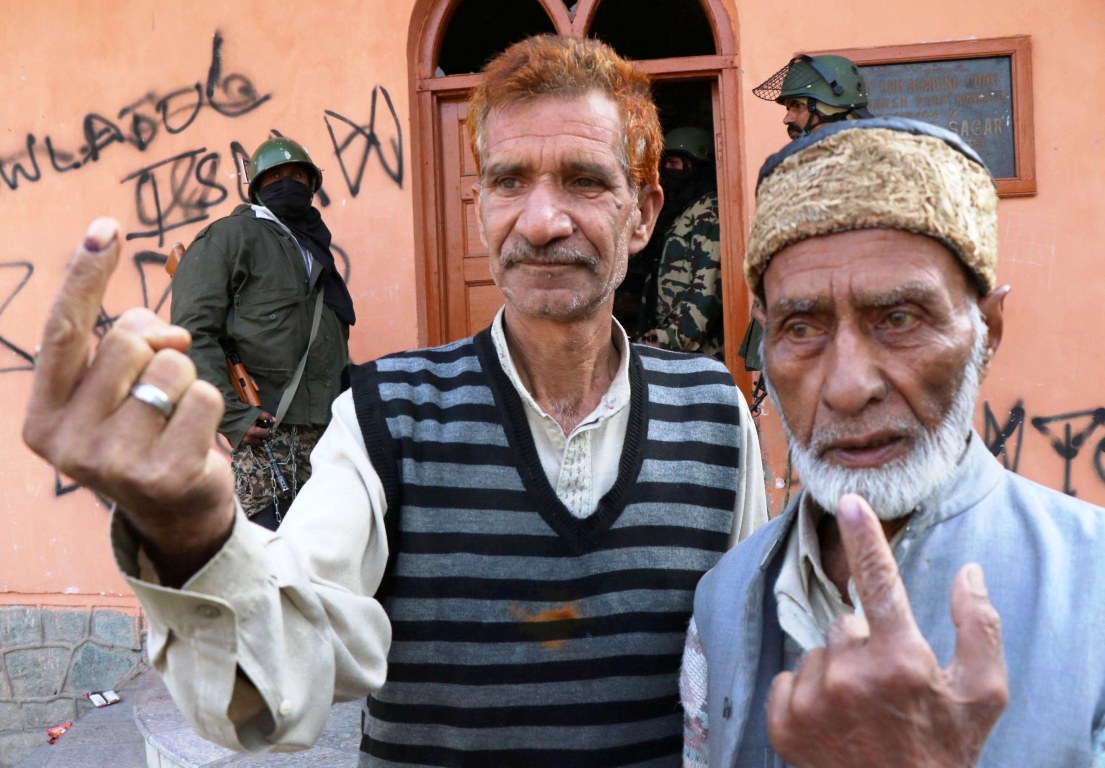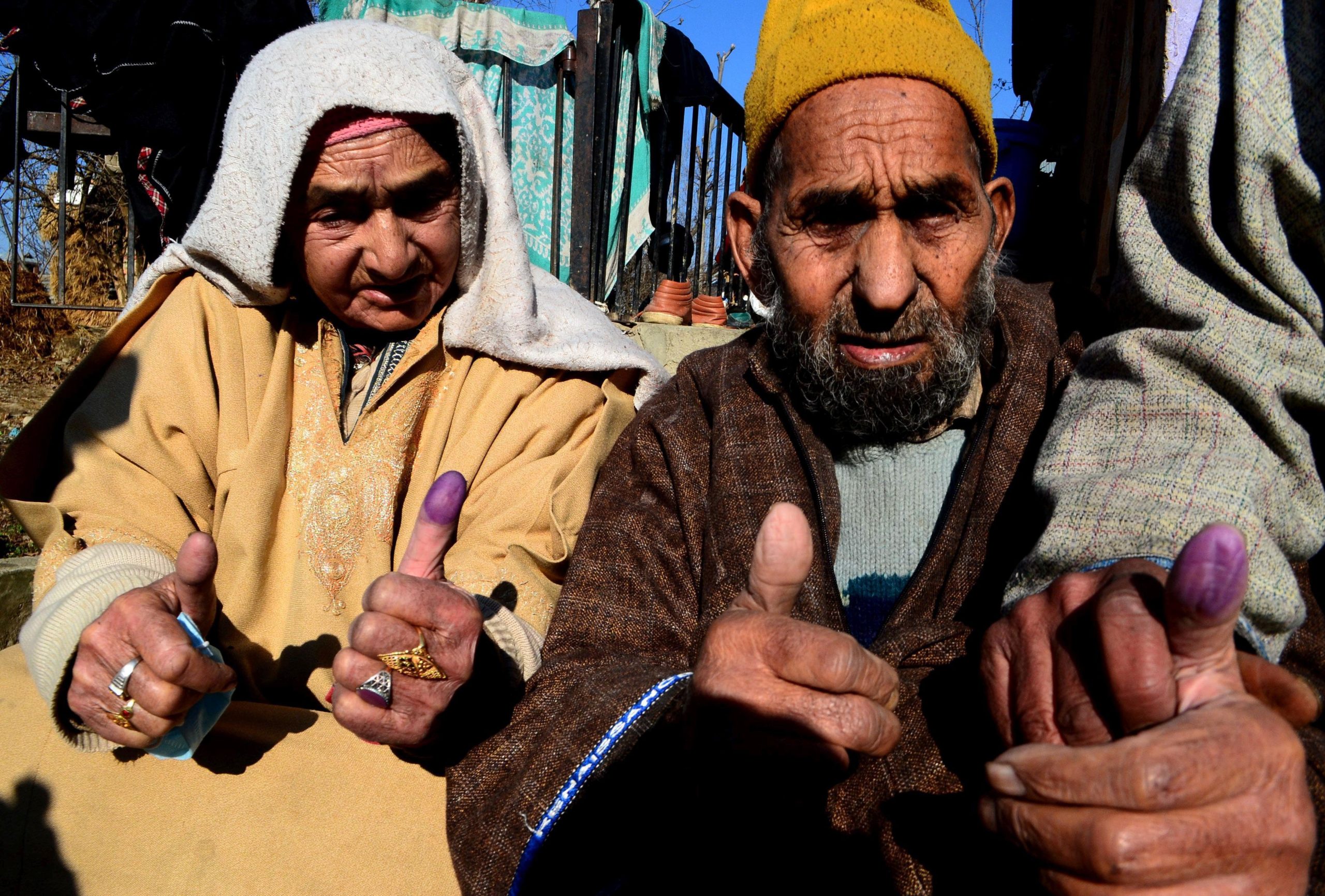by Mudasir Mushtaq Khan
In the pursuit of fairness and transparency, immediate actions are required to address impediments like casteism, communalism, and the misuse of government machinery that often disrupt the smooth conduct of elections in our country.
Winston Churchill, the esteemed British statesperson and two-time Prime Minister of the United Kingdom (UK) underscored the significance of the democratic process in a memorable statement: “At the bottom of all tributes paid to democracy is the little man, walking into a little booth, with a little pencil, making a little cross on a little bit of paper – no amount of rhetoric or voluminous discussion can diminish the overwhelming importance of the point.”
Voting serves as a crucial mechanism through which individuals can assert ownership over their government and instigate change. It provides citizens with a platform to articulate their views on a national level, within their local constituency, or in support of a particular candidate. The act of voting stands as a fundamental means for citizens to actively contribute to the progress and development of their country.
The right to vote is firmly established by international instruments such as the Universal Declaration of Human Rights (1948) and the International Covenant on Civil and Political Rights (1966). Article 21 of the UDHR explicitly states that “everyone has the right to take part in the government of his country, directly or through freely chosen representatives.”
In further delineating the significance of voting, Article 25 of the International Covenant on Civil and Political Rights (1966) asserts that every citizen is entitled to the right and opportunity, without any discriminatory distinctions and unreasonable restrictions:
(a) To participate in the conduct of public affairs, either directly or through freely chosen representatives;
(b) To vote and stand for election in genuine periodic elections, conducted through universal and equal suffrage, and by secret ballot, ensuring the free expression of the electors’ will;
(c) To have access, on general terms of equality, to public service in their country.
In the legal discourse on voting, the apex court, in the case of Lily Thomas Vs. Speaker, Lok Sabha [(1993) 4 SCC 234], succinctly defined voting as the “formal expression of will or opinion by the person entitled to exercise the right on the subject or issue.” The court emphasised that citizens partake in governance through elected representatives in a Parliamentary democracy, establishing a direct link between the people and the government.
The pivotal role of the right to vote in a democratic framework cannot be overstated. It serves as the bedrock of Indian democracy, allowing citizens to elect representatives aligned with their preferences.

PHOTO BY BILAL BAHADUR
Addressing the constitutional significance of voting, the apex court, in Jyoti Basu Vs. Debi Ghosal [1982 (3) SCR 318], clarified that the “right to elect, fundamental though it is to democracy, is, anomalously enough, neither a fundamental right nor a common law right. It is pure and simple a statutory right.” Contrary to this observation, it is imperative to recognize the right to vote not merely as a statutory but as a constitutional right, originating from the Constitution itself. As stipulated in Article 326, this right is shaped by the Representation of People’s Act, reinforcing the democratic underpinnings.
The essence of the democratic polity lies in the right to vote for one’s chosen candidate. While the Constituent Assembly decided against treating voting as a fundamental right, it found a place in Article 326 of the Constitution. This article ensures that elections, both to the House of the People and the Legislative Assembly of every State, are based on adult suffrage, allowing every eligible citizen, not less than 18 years of age, to be registered as a voter.
In the clarifications provided by the apex court, it becomes evident that while the right to vote may not be classified as a fundamental right, the freedom to make choices through the ballot is inherently linked to the freedom of expression guaranteed under Article 19(1)(a).
The case of Union of India v. Association for Democratic Reforms clarified the citizens’ right to express themselves through the electoral process. Proposition No. 7 emphasizes the importance of voters knowing the antecedents, including the criminal past, of candidates for MP or MLA, highlighting the interplay between the constitutional right to freedom of speech and expression (Article 19(1)(a)) and parliamentary elections in Indian constitutional jurisprudence.
In a separate ruling, while affirming citizens’ right to cast a negative vote and underscoring the connection with the constitutional right to freedom of speech and expression [Article 19(1)(a)] in PUCL v. Union of India (2013), the Supreme Court of India endorsed the citizens’ constitutional right to register disapproval by not voting for any candidate. The Chief Justice remarked, “Giving the right to a voter not to vote for any candidate while protecting their right of secrecy is extremely important in a democracy. Such an option gives the voter the right to express their disapproval of the kind of candidates being put up by the parties. Gradually, there will be a systemic change, and the parties will be forced to accept the will of the people and field candidates known for their integrity.”
Emphasising the essence of voting, “National Voters’ Day is celebrated every year on January 25, aiming to educate new voters on the importance of their vote and their responsibility to participate in elections.”

Major Electoral Reforms
Electoral reforms play a pivotal role in fostering inclusivity, curbing corruption, and fortifying India’s democratic foundations. Key reforms instituted by the Election Commission of India since 2000 encompass diverse aspects:
- Lowering the voting age (61st Amendment)
- Augmenting the number of proposers and the security deposit
- Adoption of Electronic Voting Machines (EVMs)
- Disqualification on conviction for violating the National Honours Act, 1971
- Restriction on contesting from more than 2 constituencies
- Reduction in the campaigning period
- Prescribing a period for Bye-elections
- Imposing a cap on election expenditure
- Restricting exit polls before the final phase is concluded
- Facilitating voting through postal ballots
- Mandating candidates to declare criminal antecedents, assets, etc.
The Election Commission prioritises accessibility through Model Polling Booths and addresses gaps in voter participation with the Systematic Voter’s Education and Electoral Participation program. Electoral flexibility is evident with VVPAT machines, the NOTA option, and the decriminalization of candidates with criminal records. Persistent challenges include the criminalization of politics, social media misuse, casteism, and regionalism. Addressing the voting needs of inter-migrants and curbing criminal entry into politics is crucial. The ‘One Nation, One Election’ proposal, aimed at minimizing government expenditure and disruptions, requires prompt implementation for the sake of efficient governance.
Safeguarding and Expanding Voting Rights
The right to vote, a fundamental human right, stands as a cornerstone in the functionality of a democratic society. It is not merely a privilege but a national duty, forming the bedrock of our democratic structure, warranting protection and extension to all citizens. The essence lies in ensuring that every citizen’s voice is heard, fostering equal participation in the nation’s political process.
Recognizing the pivotal role of voting, efforts should be directed towards enhancing accessibility through initiatives such as automatic voter registration, early voting, the development of an anywhere voting app, email-in voting, WhatsApp voting, and provisions for people with disabilities. Making voting as accessible as possible is vital to uphold the democratic principle that every vote counts.
In the pursuit of fairness and transparency, immediate actions are required to address impediments like casteism, communalism, and the misuse of government machinery that often disrupt the smooth conduct of elections in our country.

Additionally, raising awareness is crucial. Citizens, especially the younger demographic, must be well-informed about candidates, ballot issues, and their rights as voters. The introduction of a dedicated chapter on Voting Rights in the national school curriculum would instil the essence of voting among the younger generation, thereby strengthening our democratic foundation.
In conclusion, all possible measures must be taken to ensure that every citizen has the right to vote and that their votes are counted fairly. Upholding and expanding voting rights not only reinforces the democratic ethos but also ensures inclusive and participatory governance for the benefit of all citizens.
(The author is an Advocate and Government Law Officer in the Department of Law, Justice, and Parliamentary Affairs, Jammu and Kashmir. Ideas are personal.)














